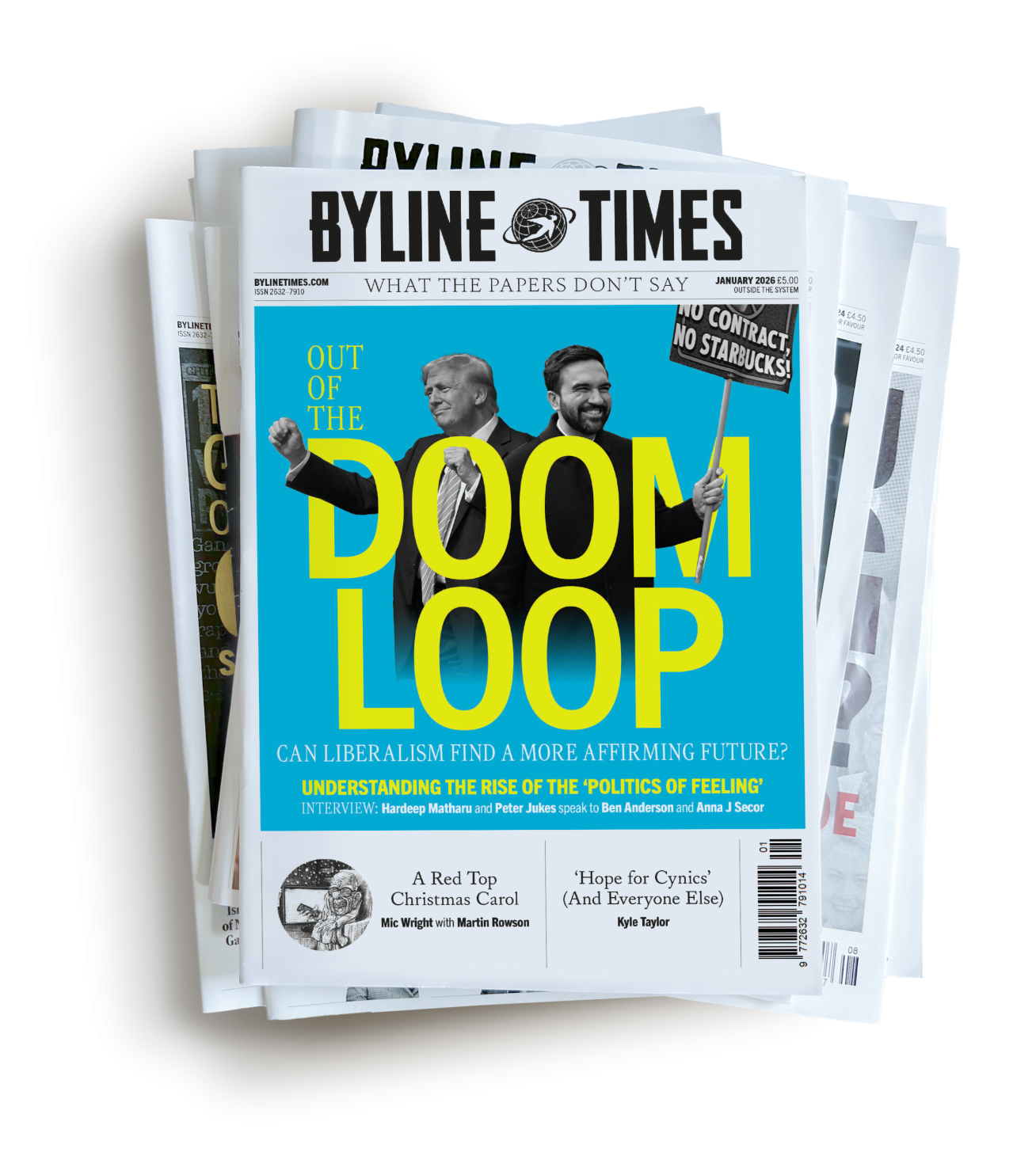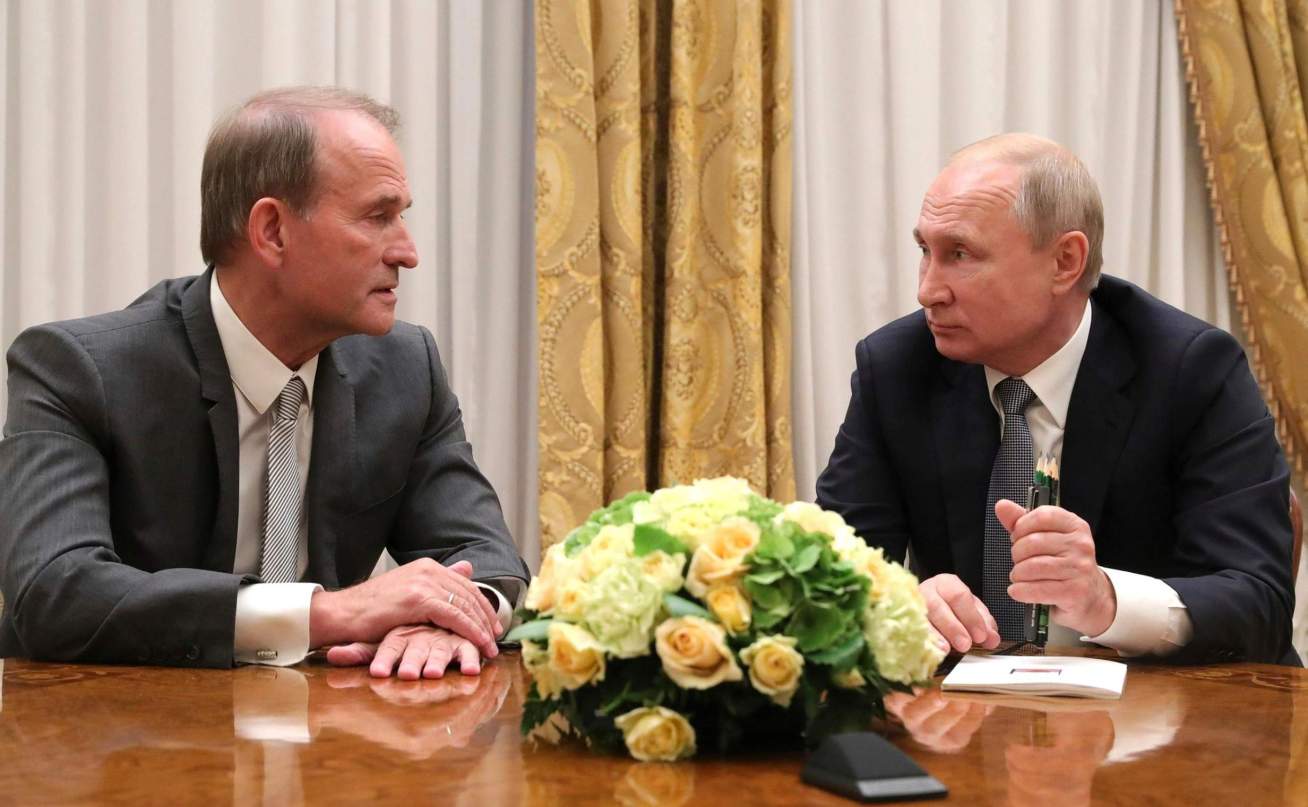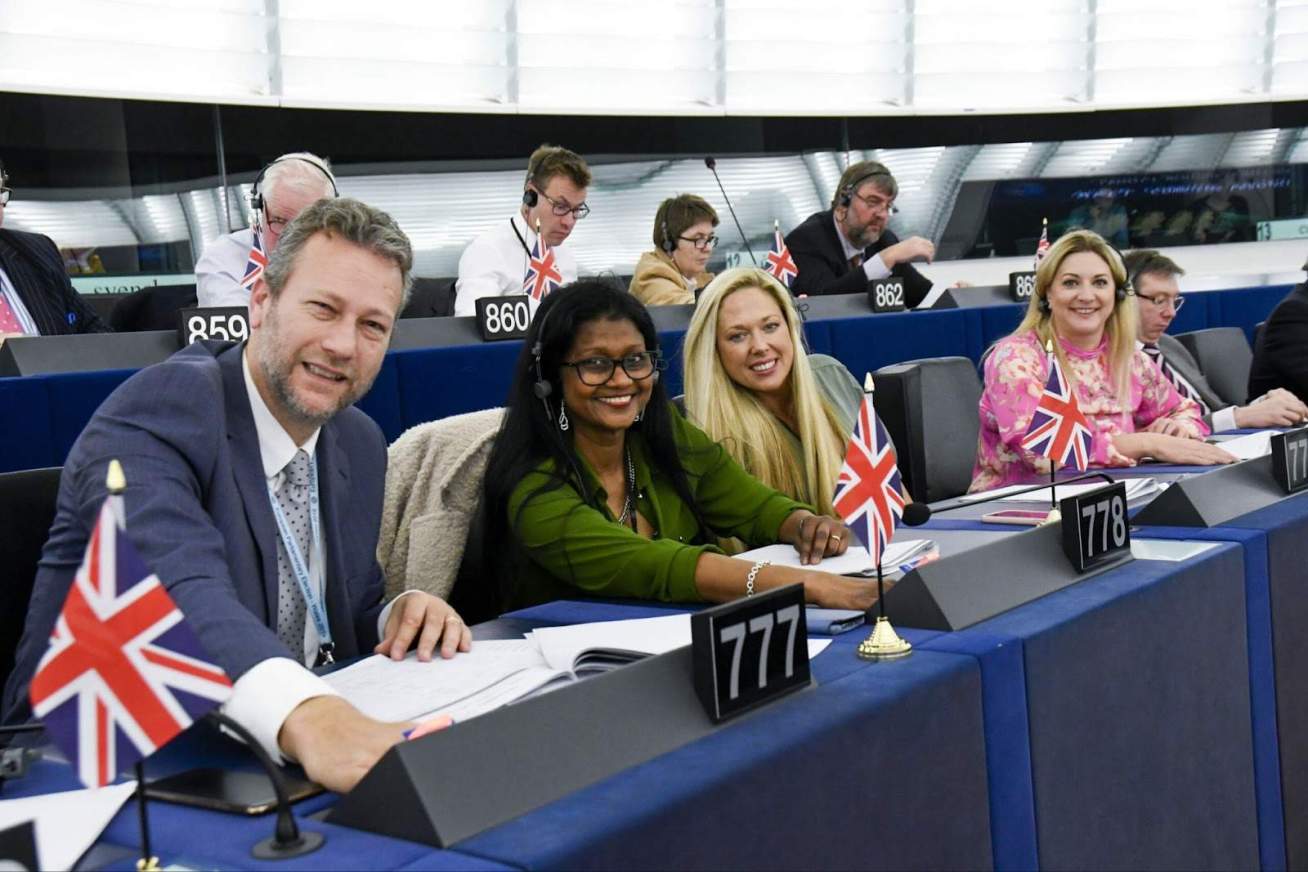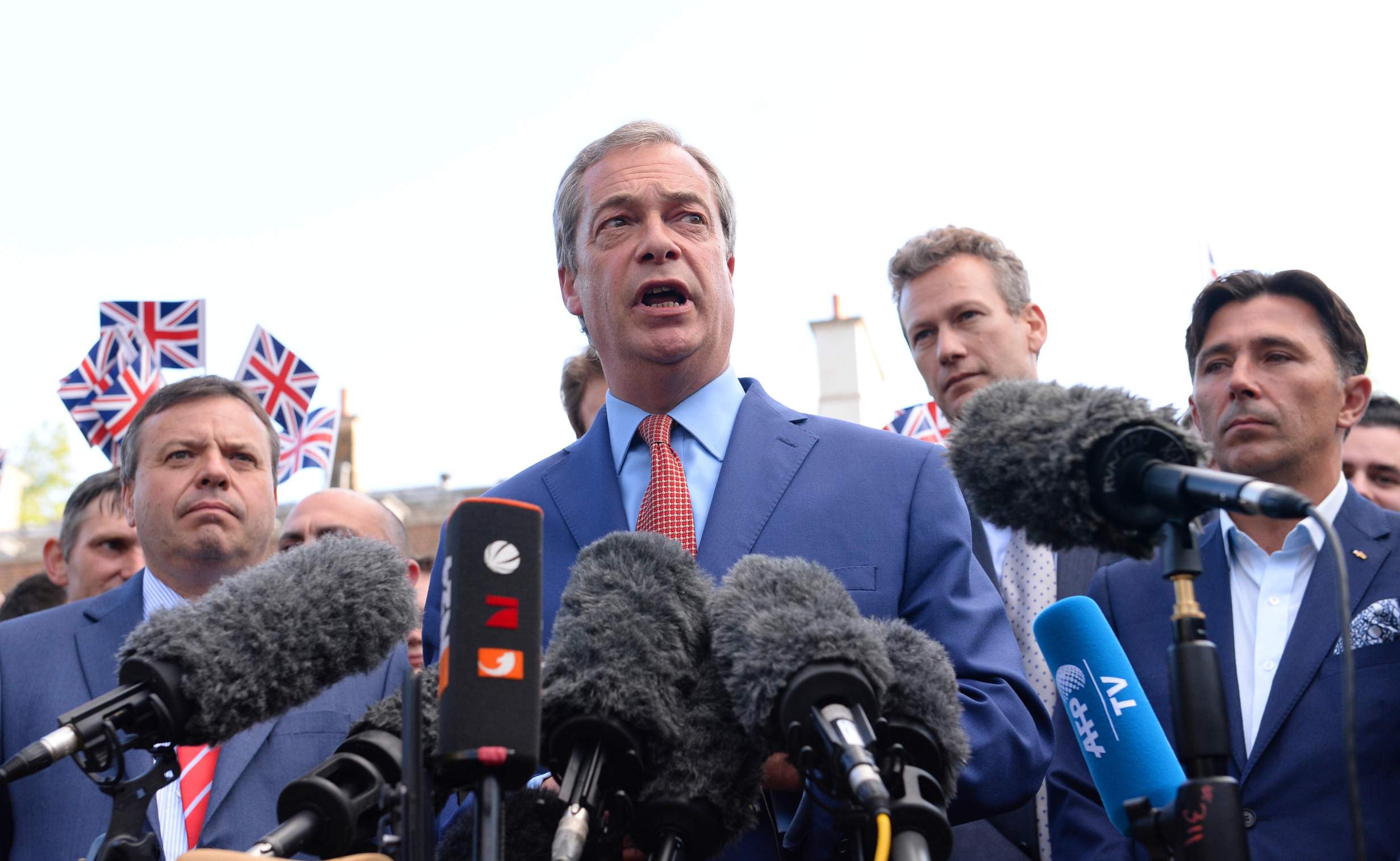
Read our Digital & Print Editions
And support our mission to provide fearless stories about and outside the media system
Every picture tells a story.
After the former Welsh Leader of Reform UK, Nathan Gill, recently pleaded guilty to eight counts of bribery for receiving money to promote Kremlin narratives, Zia Yusuf, head of Reform’s Department of Government Efficiency, told the BBC that “most people in the senior leadership team have never really heard of the guy” and that he was just “one of tens of thousands of people” the party’s leader Nigel Farage “meets on an annual basis”.
Then the photos began to circulate.
Gill was pictured at the Leave.EU group’s party on the evening of the EU Referendum in June 2016, and one of the top four figures celebrating the victory of Farage’s campaign on College Green outside Parliament on the morning after the vote.

There are videos of Farage supporting Gill for the leadership of Welsh UKIP, saying that he had “worked closely” with him and that he was “hard-working, honest, and loyal”. He told the BBC in 2016 that his fellow MEP had “never, ever let me down” and that Gill “was honest as the day is long“.
Pictures emerged of Farage campaigning for Gill as a candidate for UKIP’s successor, the Brexit Party – also led by Farage – in Merthyr Tydfil in 2019, with footage showing them both walking around as Farage is questioned by Channel 4 News’ Matt Frei on his funding streams.
Nathan Gill, then, was not just one of the “tens of thousands of people” the Reform Leader met every year.
And Byline Times can now reveal that, during the crucial period when Gill was most active, working directly with Russian President Vladimir Putin’s most senior ally in Ukraine, he was also one of Nigel Farage’s closest confidantes.
No Bit-Part Player
Nathan Gill’s Old Bailey guilty verdict followed his being stopped by counter-terrorism police at Manchester Airport in September 2021. A series of WhatsApp messages on Gill’s seized devices revealed that he had been taking bribes, from December 2018 to July 2019, from a pro-Russian Ukrainian MP, Oleh Voloshyn.
Six months earlier, in May 2021, Gill’s close associate, the Polish activist and lobbyist Janusz Gabriel Niedźwiecki, had also been detained by Poland’s Internal Security Agency on charges of espionage for Russia.
Gill had made at least four trips to Ukraine and Moldova in 2018 under Niedźwiecki’s auspices, speaking at parades and forums organised by pro-Russian separatists and Russian businessmen, with travel arranged by a Moscow travel agency.
But, according to the prosecution at the Old Bailey, the WhatsApp orders issued to Gill were part of a separate project: to support Viktor Medvedchuk.
Known as ‘Moscow’s Man in Ukraine’, Medvedchuk is a senior Ukrainian politician and a personal friend of Putin, who is the godfather of his child Nadia.
Medvedchuk was sanctioned by the US and EU in 2014 for his role in supporting Russia’s annexation of Crimea and backing separatist movements in eastern Ukraine. In 2019, he was already facing charges of treason in Ukraine.
In July 2019, only two weeks after Nathan Gill returned to the European Parliament representing Farage’s new Brexit Party, he hosted a roundtable with other MEPs, in which Medvedchuk (filmed like other Gill hosted meetings by Medvedchuk’s TV channels News One and 112 Ukraine) announced a new “peace plan” that would bring an end to the war that had been raging in eastern Ukraine – on Russian terms and by keeping the country firmly under Kremlin control.

This announcement was so important that Medveduk travelled the next day to Moscow to meet Putin, where the Kremlin recorded him as saying: “I presented my peace plan to the newly-elected European deputies from Great Britain, Germany, France, Spain, Italy, Belgium, Bulgaria and Slovakia.”
Though the plan failed and was followed by a full-scale invasion of Ukraine by Russian forces, Medvedchuk remained so key to Putin that, when arrested by Ukrainian authorities in April 2022 on charges of treason and passing on military secrets, the Russian President was willing to trade no fewer than 215 Ukrainian prisoners of war to rescue him.
Far from being a mere bit-part player in the various Russian operations to stifle Ukrainian independence, it seems that Nathan Gill was active at a strategic international level in the biggest looming conflict in Europe since the Second World War.
Which raises the question: how much did his party leader, Nigel Farage, know about this?
‘Honest as the Day is Long’
Byline Times has spoken to several people who were familiar with the workings of UKIP and its European Parliament members as it transitioned to the Brexit Party and then Reform UK following the EU Referendum of June 2016.
All asked for anonymity for fear of retaliation, but painted a consistent picture of the years that followed as Farage’s Brexit success made his MEPs redundant – and he was contemplating his future on the wider stage of UK and US politics.
While Farage was infrequently in Strasbourg, former MEPs, working away on the third floor of their offices, describe him as increasingly remote but still controlling in his large seventh-floor office.
He was “living in another world” as he pursued his connections to Donald Trump’s eventual White House Chief of Staff Steve Bannon. But one of his closest and most trusted MEPs remained Nathan Gill.
Insiders describe the two politicians as being as “thick as thieves” as they plotted their exit from Europe and UKIP. This bond remained strong throughout the period from 2018 to 2019, when Gill was illegally working for Russian interests.
When Farage quit UKIP in December 2018, Gill followed him out just two days later.
By February 2019, when Farage announced his new Brexit Party, Gill was one of the very first of seven former UKIP MEPs to sign up. The two remained side by side through the Brexit Party’s peak – campaigning together in 2019, sitting as MEPs until the UK left the EU in January 2020.

Of the 24 UKIP MEPs elected along with Farage in 2014, Gill was the only one to survive all the way to Farage’s newest party, when Gill was appointed Leader of Reform in Wales in March 2021. At the time, this was the most senior party appointment apart from Farage.
Gill resigned after failing to win a Welsh Parliament seat in the 2021 May elections.
Those who spent time with Farage and Gill in Strasbourg do not doubt that they were close. One insider told Byline Times that Gill’s trips to Ukraine and Moldova raised eyebrows in the group, as they seemed to have little to do with the party’s main focus on its relationship with Europe after Brexit.
Another claimed it was “inconceivable” that Farage would not have known about his MEP’s movements, as he “micromanaged” travel budgets and foreign trips.
Visits to the Embassy
This is not the first time a close associate of Farage has been revealed as a Kremlin influencer.
As Byline Times revealed six years ago, Maltese Labour Party member Sharon Ellul Bonici had been a close friend and associate of his since at least 2003, when he raised money for her ‘NO2EU’ campaign during Malta’s Referendum on whether to join the EU.
Described by those who knew her as warm and sociable, the accounts of Sharon’s husband, Kevin Ellul Bonici, a fluent Russian speaker who studied in Moscow, are more mixed.
The couple are now divorced, but back in Strasbourg during the heyday of UKIP, Ellul Bonici ran the party’s communications, posting YouTube videos, until he was expelled from his European Parliament role after being caught distributing Russian propaganda leaflets and books in MEPs’ cubby holes.
Two years later, in 2017, the Guardian revealed that Ellul Bonici was liaising with Russian Embassy officials in Brussels to help with a Kremlin smear campaign against Putin’s opponents.
Also revealed that year, at least to Isabel Oakeshott, ghostwriter of Arron Banks’ 2016 book The Bad Boys of Brexit, were the multiple visits to another Russian Embassy – this time in London – by Banks, the Bristol businessman who was Farage’s main Brexit backer, and his head of communications, Andy Wigmore.
Oakeshott had come across emails detailing multiple meetings and discussions of gold and diamond deals between the two Leave.EU campaign officials and various Russian diplomats in the months before and after the EU Referendum.
In a statement prepared for The Sunday Times in November 2017, when Oakeshott initially planned to publish the emails – seen by Byline Times – she wrote: “The material clearly shows that they discussed Brexit and personal enrichment opportunities with senior Russian officials. They met several times with men they knew to be members of Russian intelligence services and passed them sensitive documents. They claim to be patriots, but when the UK and Russia had a political dispute, they publicly and privately supported the Russian position.”
Oakeshott concluded that she had “no doubt that Banks and Wigmore have been acting as agents of influence for the Russian state” but was also emphatic “that neither Nigel Farage… nor Richard Tice, co-founder of Leave.EU, are in any way implicated in this affair”.
The assertion that Tice and Farage knew nothing about the embassy visits may suggest that Oakeshott informed them of her discoveries by late 2017.
But, by the time journalist Carole Cadwalladr and I eventually published the emails about the Russian Embassy in the Observer six months later, sources claimed that Oakeshott was in tears apologising to Farage.
In light of this, it becomes reasonable to ask: how could Nigel Farage not have been alert to Nathan Gill’s pro-Putin activism in 2018 and 2019?
A Russian Intelligence Operation
Isabel Oakeshott’s revisiting of the emails of Banks and Wigmore was a result of Special Counsel Robert Mueller’s Inquiry into interference in the 2016 US Presidential Election which was mainly organised by Russian military intelligence (GRU). It is unlikely that Farage could have been unaware of this investigation.
Many of the lines of Mueller’s inquiry led back either to the Russian Embassy in London, or his US associates – Steve Bannon, election strategist Roger Stone – and, of course, Donald Trump himself, for whom Farage had appeared on the ‘Make America Great Again’ campaign trail.
In June 2017, Luke Harding reported in the Guardian that Farage was a “person of interest” by the FBI owing to his connections to so many of the players under investigation.
While Bannon, indicted for wire fraud and money laundering, and Stone, convicted for obstruction, false statements and witness tampering, received last-minute presidential pardons before they served prison time in 2021, President Trump was too late to save his campaign manager, Paul Manafort.
By the time he was pardoned in December 2022, Manafort had already served two years in prison of a seven-year sentence for tax fraud, bank fraud, conspiracy against the US and obstructing justice, witness tampering, and his secret lobbying for the Ukrainian Party of Regions led by the pro-Putin Ukrainian President Viktor Yanukovitch.
This is where Gill’s paymaster, Oleh Voloshyn, the pro-Russian Ukrainian MP, comes into his own.
Voloshyn was not only a Ukrainian MP belonging to the party of Putin’s ‘man in Ukraine’, Viktor Medvedchuk, but according to The Brussels Times, he was also a business partner of Manafort, who continued work for Yanukovitch after he was ousted in the 2014 Maidan revolution and fled to Russia.
In December 2017, Voloshyn authored a Kyiv Post op-ed defending Manafort, then facing prosecution in the US for his undeclared lobbying in Ukraine. Court filings later showed that Manafort himself edited the text before publication, despite a court order restricting his public commentary (leading to the further charges of witness tampering). Voloshyn told Reuters that he had run the draft past one of Manafort’s other close associates, Konstantin Kilimnik, “to make sure it was accurate”.
Kilimnik appears many times in the Mueller and US Senate Intelligence Committee reports as someone close to Russian military intelligence, and he is a key link between Manafort, the Trump campaign, receiving US voter data most likely processed by Cambridge Analytica.
In 2022, the US Treasury sanctioned Voloshyn for his collaboration with Kilimnik and Manafort. According to a former senior British intelligence officer, this would suggest that the bribery charges are not just indicative of Kremlin propaganda or influence operations, but suggest “a Russian intelligence operation relating to Gill”.
Voloshyn and his wife fled Ukraine for Belarus a few days before the full-scale Russian invasion of Ukraine.
A Russian Chorus
Questions about what, and the extent to which, Farage knew about this aspect of Nathan Gill’s political lobbying for one of Putin’s closest allies are brought into sharper focus by a photograph taken outside the European Parliament of him with Oleh Voloshyn’s wife, Nadia Borodi.
Also known as Nadia Sass, Borodi worked as a presenter on Medvedchuk’s Ukrainian TV channels and is described as a “Russian propagandist” by the French investigative news site Desk Russie. She had clearly met Nathan Gill.
The picture appears to have been taken in 2018, but resurfaced again when Borodi posted it on X in April last year, from her hideout in Minsk, with the message: “I will still miss @Nigel_Farage and his team there. No one has ever rattled the Brussels swamp as he did.” Two months later, in a BBC interview, Farage was repeating his claim that the West had “provoked” Putin – the first time he had done so since the full Russian invasion.

So did Nigel Farage know the source of Nathan Gill’s payments, Oleh Voloshyn, either directly or through his wife Nadia? Did he not know about his fellow Brexit Party MEP’s roundtable with Medveduk, ‘Putin’s Man in Ukraine’? Did the Reform Leader not realise that both were connected to his friend Donald Trump via his campaign manager, Paul Manafort? Did he check that there was no further involvement of Russian intelligence? And did he make sure that no money was passing hands that would fatally compromise his closest MEP at the time?
Reform UK and Nigel Farage did not respond to requests for comment.
While these questions remain unanswered, there appears to be a consistent alignment between senior members of Reform and Kremlin messaging.
For Farage, this dates back to 2013 and his first (initially denied) meeting with the Russian Ambassador in London, Alexander Yakovenko, later identified in the UK Parliament’s Russia Report as a key Kremlin influence operator.
From then on, until the channel was banned in 2022, Farage had a regular paid role on RT (formerly Russia Today), which covered speeches he made in the European Parliament, generally using the Kremlin’s broadcaster to attack the EU and NATO.
Promoted by RT as a “truth-teller”, Farage appeared 14 times on the channel in 2014 – the same year he told GQ magazine, when asked which world leader he admired most, “as an operator, but not as a human being, I would say Putin. The way he played the whole Syria thing. Brilliant”.
Farage’s admiration for Putin was echoed by his closest allies two years after the first Russian invasion of Ukraine during the Brexit campaign.
As Farage warned against “demonising” Russia, Arron Banks tweeted in July 2016 that “the Crimea was part of the Russian empire in the 1700s, no different to Gibraltar”.
In November that year, Banks claimed that “Crimea is as Russian as the Isle of Wight is British” and blamed the EU – “Putin acted rationally over Crimea and Ukraine due to EU expansion plans” – and said that the UK should be joining forces with Russia to face down ISIS.
In the same year, well before he was proven to have been paid to echo Kremlin messaging, Nathan Gill was singing the same tune.
“Russia is not our enemy”, he told the Strasbourg Parliament. “The EU and NATO are to blame for provoking this conflict. Sanctions on Russia are wrong and hurt ordinary people far more than leaders. We should stop demonising Russia and instead work with them against real threats”.
While the European Parliament has concluded that Russia’s intelligence services systematically targeted far-right and Eurosceptic parties across the continent, there is no suggestion that Farage or Banks ever received or sought any unlawful inducement for their opinions about Russia – unlike Nathan Gill.
But, as Reform continues to rise in the polls, the ideological alignment raises urgent questions in need of answers.
The investigative journalist, Carole Cadwalladr, who was sued by Banks over remarks she made in a TED talk about Banks’ relationship with Russian Government officials, said that the revelations about Nathan Gill – and Byline Times’ exposure of his closeness to Farage – made an inquiry into foreign interference in UK politics an urgent necessity.
“It is outrageous that Rachel Reeves should allege this week that Farage is ‘in bed’ with Putin while her Government is still refusing to launch an inquiry which Parliament’s own Intelligence and Security Committee has said is the essential first step to protecting our elections,” she said.
“With the non-profit, The Citizens, and a group of MPs, we’ve been campaigning for this inquiry and pursuing it via legal means in the High Court and now Europe.”



